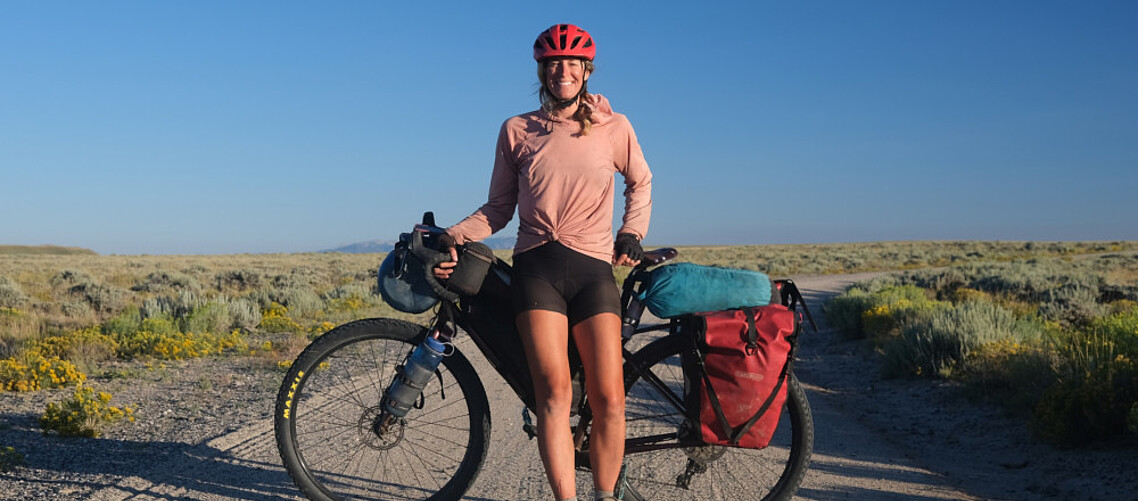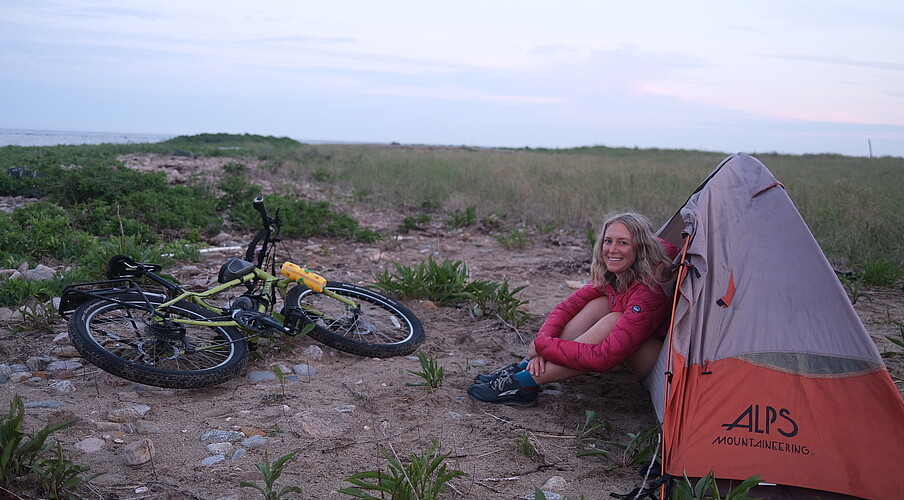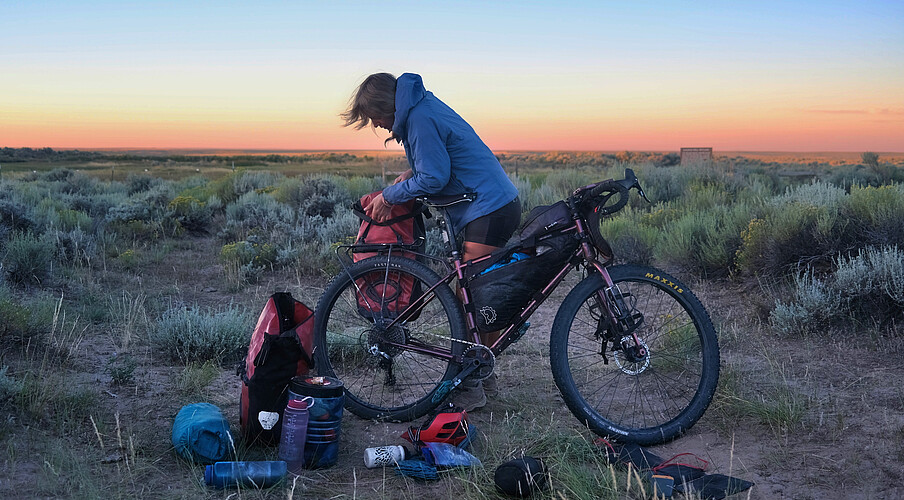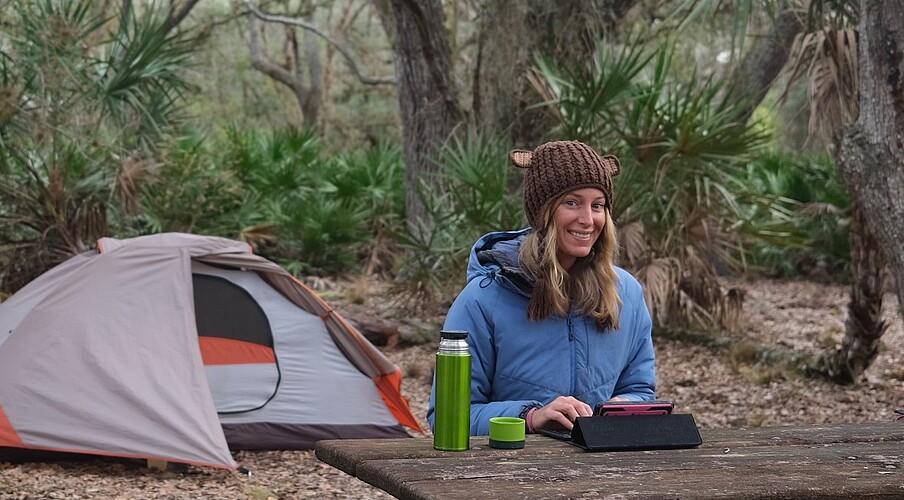Mid-2024, a hypothetical question was posed on TikTok. If you were a woman alone in the woods, would you rather encounter a bear or a man? The answers came flooding in and they were as clear as crystal: the vast majority of women said they would prefer to run into a bear rather than a man.
The “man vs bear” debate might have started on a social media platform probably best known for videos of people dancing and singing but it sparked a serious conversation about women’s safety. By far the most potent response to the viral debate came from Laura Killingbeck, an award-winning writer, storyteller, and adventurer who wrote a reflection for Bikepacking magazine that has itself spread far and wide.
A "clear and brilliant" unpacking of the patriarchy
The essay – titled A Woman Who Left Society to Live With Bears Weighs in on “Man or Bear” – was described by acclaimed writer Rebecca Solnit thus: "Laura Killingbeck’s unpacking of what patriarchy means and how it impacts both men and women is one of the most clear and brilliant I have read”.
At ECWO, we wholeheartedly agree with Solnit’s assessment of this important piece of writing, which is why we invited Killingbeck to our 2024 conference where she will be a keynote speaker on Friday, 15 November in Rotterdam. We have also loved getting to know Killingbeck’s other writing through her online platform where she shares her work as an adventure journalist, covering “topics like biking, backpacking, outdoor gear, ecology, tiny houses, food, foraging, and all subjects related to nature and the outdoors”, as well as stories that explore themes of hope, resilience, and transformation.
Killingbeck takes an intersectional feminism lens to the topics and themes she explores and reads deeply on the patriarchy, on feminism and more. In true autodidactic fashion, she is constantly learning, frequently looking for writers with viewpoints beyond the mainstream - much like the life she has chosen to lead, which is in no way ordinary. As she wrote in her Bikepacking essay, “I’ve spent most of my life traveling open roads, seeking solace in nature, looking for the edges of myself and the world”. She’s often working from what she calls the “backcountry”, frequently writing while hiking and biking long distances, perched on a mountainside in her tent.
ECWO’s Diane Coetzer spoke to Killingbeck ahead of her upcoming keynote which will address the value for society of encouraging ‘’Wholeness’’, from her unique perspective as an independent female adventurer.
We are really pleased to be the place where you will deliver your first keynote in Europe. How are you feeling about speaking to an audience outside America?
It’s an honour and a delight to be speaking at ECWO’s conference. In my preparation conversations with Dory (Grandia, ECWO’s Associate Director of Programming) and Hanneke (Takkenberg, ECWO’s Executive Director) I sensed an openness to conversations and the feeling of an organisation that is looking in-depth at many of the themes and topics that interest me. I am just delighted to be connected with ECWO and look forward to connecting with the community that will be at the conference.
You describe yourself as a writer and visual storyteller. Why do you believe it is important to add “speaker” to that – in other words, to expand the way you reach people with stories?
I started writing as a way to process the world and what was happening to me, and I was very lucky that people connected with those stories, writing back to me, sending me messages and telling me about their lives. And so the writing went from being a way of processing things on my own to really being a way to connect with people and learn from them. It was soon clear that, although I was writing about my own life, it became about a shared path with the readers. Having the opportunity to start sharing stories through speaking to audiences is a wonderful new opportunity for connection with people. And it is not one that I take for granted: There have been times when I have had something to say and was not listened to in the way I would have wanted so to be able to step into the position of sharing my reflections, thoughts and viewpoints in a room with people in it is really quite lovely. Of course, there are moments of nervousness because it is so different from my writing, which has often been in caves or on mountain tops and so is very solitary.
You’ve spent more than a 1000 nights in your tent, traveled tens of thousands of miles by, as you say on your website, “bike, foot, thumb, and boat” and also spent significant time living and working in experimental communities. By opening yourself to the world in these ways, you discovered wholeness and your upcoming keynote at our conference addresses this directly. Can you share a little on the value for society of encouraging ‘’Wholeness’’ ahead of November 15th?
I feel like I've spent most of my life kind of on this quest for something that I haven't really been able to articulate for a long time. I left home when I was 18 and hitchhiked across the United States and Mexico for a year, just kind of living on the streets and it was such an education, such a journey of learning. After that I spent a lot of time in the back country, doing multi-month trips, either cycling or hiking, in different areas all over the world. Spending that extended time in nature helped me to see myself in a way that was very different to how I saw myself in society. And it allowed me to be a body that was kind of free, to be someone was free to be a person without many of the constraints or expectations of what it meant to be female, or to act in the way that women are expected to perform our femininity in the world. And I think the absence of those expectations, or the slow kind of eroding or forgetting of them while I was in nature, gave me a sense of wholeness that felt so real and felt like the thing I had been looking for, without knowing it. So I've really spent a lot of time reflecting on that feeling while toggling back and forth between spending these extended periods of time out in nature, and then coming back to people in the world and society. I look forward to sharing my thoughts on what it means to be whole and what connection is - and why these have value.
In a recent interview you said leadership today requires soft skills that are really hard – that leadership requires a lot of empathy and connection. ECWO is situated in a business school and these are not leadership traits that have traditionally been taught or valued in business. How can we start to change that?
I really believe in opening up conversations and I see what ECWO is doing, through its work, through the conference, as part of that. When you open up those pathways to conversations, people will come and fill them. People will put all their energy into those streams of thought and expand them and broaden them. I have been thinking about when I first started writing – at that time for the Adventure Cycling Association. One of my first editors, Jessica Zephyrs created a feminist newsletter within the cycling industry and that gave me an opportunity to write a monthly column on themes and topics that did not fit in anywhere else in the world of cycling journalism. She opened up this pathway and a diverse group of writers filled it and the readers responded. I think that the conversation about the value of soft skills like empathy and connection in business can be opened up and, over time, it will become multiple conversations that then reach more and more people.
You wrote a powerful reflection on empathy called Empathy is a Survival Skill in which you identify agency and self-worth as critical to empathy, especially as a woman living in a patriarchy. Do you have thoughts for our ECWO community on how to build that in ourselves.
For me the start of empathy really is a sense of self compassion. Compassion for the self. And I don't mean that in an easy way. I mean that in a difficult, gritty way of looking at the things about myself that I don't want to know or that I don't want to see or that I am afraid of. And then really going there and trying to accept those difficult parts. Once I began going down that path, I started to feel a larger sense of acceptance and self-compassion and this builds more empathy for the world around me and the people in that world and also everything that has happened to me and will happen to me. I think there is this idea that empathy is just about this total openness or, you know, about listening to someone else before you listen to yourself. But I don’t think of it that way. I really think of it as a balance and, as a female living in a patriarchy, I think that a lot of that balance has been stripped from us in, in very particular ways. And by that I mean that women are really trained to not have the same sense of boundaries and agency as men, to be the decision makers of our own lives. This is important because in order to choose empathy, we have to have agency, we have to be ourselves first. We have to have critical thinking to protect ourselves too, in reasonable ways. I would encourage the ECWO community to actively go into building self-compassion as the foundation of empathy. The best resistance to patriarchy is to practice love for yourself and love for each other and then bolster those things.
You have been a writer for many years. Were you surprised when another one of your reflections - “A Woman Who Left Society to Live with Bears Weighs in on Man or Bear” – went viral?
I was really nervous about publishing it because it contained the P word - patriarchy - and sometimes that can create a lot of controversy. I really didn’t know how it was going to go over. On the day it was published, I planned to be out on a bike ride because I really didn’t know what people were going to write to me. But there was such an overwhelming response right away, of just so much positivity and so much support and of course I could not have predicted that the story travelled as far as it has. I have received inquiries from all over the world and been invited to speak in all these different countries which is just incredible. I also now have the opportunity to work with Michigan’s Community Financial Credit Union in America, on a project to end gender-based violence. In the summer of 2025 I will pedal across Michigan, visiting nonprofits that support women. Along the way I will listen, learn and tell stories about gender-based violence and women’s incredible strength and tenacity to redefine their lives. This directly arose from my man/bear story and I am so grateful that it has expanded the conversation, made these pathways, in different ways. That is what is beautiful about storytelling because people will take these ideas – these shared ideas, because they don’t belong to anyone – and expand them in their own direction. There really is no limit to it and I find that so exciting.
It was clear in the piece that you have done a lot of deep thinking and reading about the patriarchy in your journey to come to the conclusion that it is a “fundamental fracturing of our human wholeness”. Can you recall when you first started began thinking about the patriarchy in this way?
In my 20s up through my early 30s I spent 13 years in experimental communities, and for nine of those years I was the co-director of an experimental community educational centre in a very remote village in Central America. One of my jobs was to create some of the human structures that we needed – of self-governance, of communication, of monitoring how the group was interacting. It was a group of really beautiful people, smart people who were very driven to radically reinvent society. But even so, it became really clear that there were these baffling patterns of behaviour that I just did not understand; these persistent patterns of behaviour, especially the men in leadership roles, of really coercive control. I was just so baffled that I began to study, first looking at different systems but eventually moving into a study of gender and patriarchy and I came to identify patterns and see them unfolding in our group, over and over and over again. It was a disturbing but a very real education and I ended up leaving the group because of it and because I knew that those behaviours wouldn’t change. That was the start of really intensive study, from different angles. There were really wonderful people, working to try and create a different kind of society but still it was shocking to see how patriarchy encroached even in that environment. It was within that group that I started to feel like patriarchy was this fundamental fracturing that affects everyone, not just women.
We also love Rebecca Solnit’s writing. How did you feel when she posted a testimonial about your article? In other words, to be seen and valued by someone you admire?
Rebecca Solnit is a legend! I've been reading her work for so long, and it's been so influential on me so to have her write that generous testimonial was kind of surreal. Some months on, it still feels a little surreal.
Perhaps aligned to this – being seen and valued by another human – is that you place a high value on authentic listening. Why is this important to you? And how can we all be better at it?
Listening really became crucial for me early on, when I was 18 and I hitchhiked for that year across the US and Mexico. It was a beautiful year and I had a great experience but I was getting into all of these cars with strangers - which I don't necessarily recommend – and that was also high risk. There were situations where I would get into a car, with a man, who would start to come on to me and I had to find my way out of that situation. What I learned to do really quickly was listen to what he was saying and then, when he stopped speaking, start to describe all of the reasons why I saw him as someone who was helping me instead of someone who might hurt me, how he was being generous by giving me ride, how wonderful it was that we can trust strangers. I was basically giving that person a pathway towards being someone who was going to be kind to me instead of someone who was going to make me uncomfortable. You know, people want to be seen as good people.
Nature plays a crucial role in your life and you have chosen to live as close to it as is possible. For those of us who live in urban environments, what would you suggest we can do to draw from nature?
I don't know if there's any way to replace a relationship with nature and I think that it is crucial to form that relationship. I feel so lucky to have been able to spend so much time outside, to have pretty much sculpted the entirety of my life around nature but, of course, not everyone can do that. Still, I believe it is vital to foster that relationship, however we can - even if it is through walking through a small area of greenery or just taking the time to look at the sky, to look at the way clouds move. There is so much information in the way that a cloud shifts and changes through the sky, the wind pushing it this way and that, in the way that the wind moves a tree branch or a leaf. This is all emotional information that, when we really pay attention to it, becomes a part of us.



